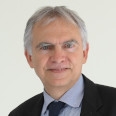Demetrios Anglos is a Professor at the Department of Chemistry, University of Crete (UoC) and Associated Researcher at the Institute of Electronic Structure and Laser, Foundation for Research and Technology-Hellas (IESL-FORTH), where he leads the Applied Spectroscopy Laboratory (since 2001). He holds a B.Sc. in Chemistry (1986) from the University of Athens, Greece and a Ph.D. in Physical Chemistry (1994) from Cornell University, U.S.A. The activities of his research group focus on a) the study of photophysics in molecules and novel nanomaterials with potential sensing applications, for example, ZnO/polymer hybrids or carbon nanomaterials and b) the applications of laser spectroscopic techniques (LIF, LIBS, Raman spectroscopy) in the analysis of materials, with particular emphasis on the development of mobile, field-deployable instrumentation. In this context, the Applied Spectroscopy Lab at IESL-FORTH has developed novel instruments, based on the LIBS technique, specially designed for studying archaeological objects and works of art on site and adapted a mobile micro-Raman system likewise for supporting analytical campaigns in museums and archaeological sites. In 2022, the lab completed the construction of a micro-LIBS spectrometer, which has been installed at the Leibnitz Institute of Archaeology (Mainz, Germany) and is currently used in the context of palaeoenvironment studies, more specifically, elemental imaging of marine shell cross-sections. The output of his research is presented in over 100 publications (4 invited) in peer-reviewed journals and in several talks (25 invited) at major international conferences. In 2014, he was a speaker in the Onassis Lectures organized at several East Coast Universities (Yale, Columbia, UPenn, SUNY Stonybrook, Boston Univ.) on the use of laser technologies for the conservation of the Parthenon Marbles in the Athens Acropolis. He has been involved in a number of EU and nationally funded research projects while he has also co-ordinated a multi-site Marie-Curie Early Stage Training project (Advanced Training in Laser Sciences; 2004-2008) and a Marie Curie Intra-European Post-Doctoral Fellowship Grant (2016 – 2018). During the period 2001-2016 he served as the Technical Manager of the IESL FORTH Ultraviolet Laser Facility, currently a member of LASERLAB-EUROPa a network linking 30 major European laser infrastructures. He has over the past few years concentrated his efforts on European and National Initiatives which aim at developing Research Infrastructures relevant to Cultural Heritage Science, E-RIHS (European Research Infrastructures for Heritage Science) and E-RIHS.gr. He is teaching Physical Chemistry (Molecular Spectroscopy) at the Chemistry Department, UoC, an advanced laboratory course on modern laser-based research for Chemistry majors, and a graduate course on Laser Spectroscopy. He has supervised several undergraduate and graduate research thesis projects (30 diploma, 20 M.Sc., 8 Ph.D.), while he has been on the evaluation boards of Ph.D. theses in several European Universities. Since 2012, he has been a member of the Editorial Board of Heritage Science. In the period of 09.2022 – 07.2024, he served as the Head of the Department of Chemistry, UoC. He has also been actively involved in several Department committees including the undergraduate and graduate curriculum, safety, department internal evaluation committees, and coordinated the University committee that supported successfully the excellence award of the EU concerning the Human Resources Strategy for Researchers at the UoC. He has served, for over 6 years as an elected member of the IESL-FORTH scientific council.
In the context of 2025 – 2026 Fulbright scholarship, Demetrios will be hosted at the University of Massachusetts Lowell (UML), Kennedy College of Sciences, and will carry out his research in the laboratory of Prof. Noureddine Meliketchi at the Department of Physics and Applied Physics. The focus of this research endeavor is two-fold. First to optimize portable instrumentation, based on Laser-induced breakdown spectroscopy (LIBS), for carrying out analysis of biological samples and second to integrate machine-learning methods for spectrochemical data analysis as tools for achieving disease diagnostics. This collaboration offers the ground for extensive knowledge and expertise sharing by the UoC and UML groups with the goal of contributing with laser-based spectrochemical techniques combined with advanced machine learning tools towards the development of efficient diagnostic methodologies.

Dimitrios Anglos
University of Crete, Heraklion
Foundation for Research and Technology-Hellas
University of Massachusetts, Lowell
Analytical Chemistry
